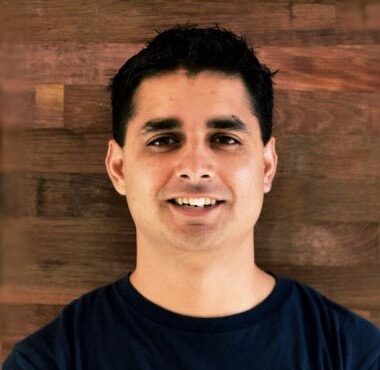
Praful Mathur
- Khoury Alumni
- BS in Computer Science ’11
- Entrepreneur
Since his childhood days, Praful Mathur relished computer science. He just didn’t always know what to do with it.
“I wanted to do anything with computers. I would stay up writing software, and I ended up not working on some school assignments so I could work on projects instead,” he recalls. “Then I broke through the school’s admin systems. It was fun, but I got into some trouble, and I realized I had to figure out where I could align my strengths.”
He initially set his sights on San Francisco, and tried to convince his parents that he wasn’t college material. But after the family toured a handful of Boston colleges and his mom insisted they check out Northeastern, the university struck a chord with Mathur.
“The thing that struck me was the co-op program,” he explains. “At my core, I’m a hacker, and Northeastern was incredible in the sense that I could apply that immediately. I knew I’d have extra projects, and to do that in the wild was really attractive.”
Now, more than a decade later, that impulse lingers. Mathur has made his living in entrepreneurship, founding multiple companies with computing at their core. And it all began during his time at Khoury College, where he joined the first cohort of coaches at venture accelerator IDEA and wrote the curriculum for the first Husky Startup Challenge.
“I wanted to be around other people who were thinking about building businesses,” he says. “It was rare on campus, and the fact that two groups were getting started simultaneously was exciting.”
By the summer after his first year, he co-founded his first company, this time in collaboration with fellow Northeastern computer science student Sergey Grabkovsky and their colleague Sumant Yerramilly. Called Amp Idea, it aimed to place advertising and credit card machines on taxicabs. Mathur, who had purchased initial equipment using money he’d saved while working, quickly found himself competing against big-name companies for Boston city contracts. They carved out the second-largest market share in the space before eventually selling the company to Verifone.
His next venture, Shotput, came soon after Mathur graduated Northeastern in 2011. It began as a more research-oriented venture based around self-driving cars, but morphed into a logistics company that aided other companies in creating product warehouses. Although it attracted some well-known customers including the Wall Street Journal, Samsung, and Red Bull, the team also made some key mistakes, and the company paid the price.
“I became cocky because I’d built my first company and sold it, so I thought I could just do it again, and that I was in my mid 20s and nothing could stop me. I just lost my way,” Mathur admits. “I learned to stick to my strengths, to know who I was and why I was doing things, and to choose the right partners and investors.”
The next few years saw Mathur involve himself with ComFreight, a freight factoring company that aids truck drivers with invoicing and collection.
“I ended up raising $3.5 million for them, as well as building out the team and initial product,” he says. “But it was just a pit stop for me. I wasn’t going to stay too long because I wanted to start something again in software.”
And after Mathur founded a nonprofit called AI on the Beach for researchers interested in animal communication, his wife gave him the spark he needed.
“She said, ‘You keep talking about dolphin communication, but you can’t tell me what our dog Kai is saying,’” Mathur remembers.
I’ve become the type of person I admired when I was in college, and a lot of it was because of Khoury College. I wouldn’t have accomplished any of this and have this kind of life without it. It has this emphasis on making things work in production, in real-life situations
Thus was born Sarama, Mathur’s latest venture, in which he strives to use AI to translate dogs’ barks into messages and alerts that pet parents can understand.
“I can get back to my core roots in software and deep tech,” Mathur says. “I think animal communication will be mainstream by the end of the decade. But it’s a niche thing right now. So my goal is to build a company that can take the research and commercialize it so there can be a sustained way of getting resources behind it.”
And as he builds momentum behind Sarama while advising other startups on how to clear the mental and psychological hurdles that often plague new operations, he can’t help but look back to the first place where he focused his own drive for computing.
“I’ve become the type of person I admired when I was in college, and a lot of it was because of Khoury College. I wouldn’t have accomplished any of this and have this kind of life without it,” Mathur says. “It has this emphasis on making things work in production, in real-life situations. And now, even in companies I advise, the top engineers are all Northeastern grads.”